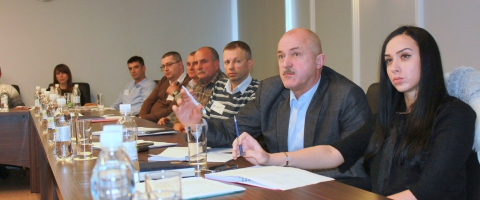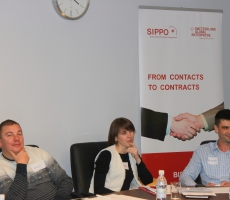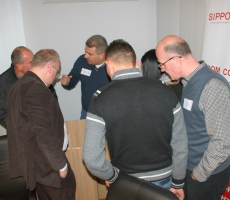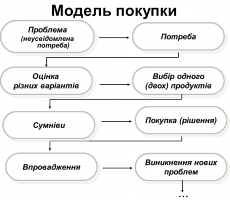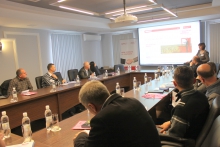
Ukrainian woodworkers are looking for opportunities to have their products exported abroad.
Participation in international trade fair is a perfect fora to access EU markets and find business partners. Ukrainian woodprocessing companies are very lucky: Swiss import promotion program SIPPO offers to 5 Ukrainian companies to participate in the world’s leading trade fair Interzum 2015.
About SIPPO
The Swiss Import Promotion Programme SIPPO of Switzerland-Global Enterprise www.switzerland-ge.com/switzerland/import supports private small- and medium-sized enterprises from countries in transition that endeavour to access the Swiss and the EU markets. More than 2000 companies over last 5 years have benefitted from SIPPO support.
In Ukraine, through collaboration between SIPPO and NGO FORZA, 16 wood processing and furniture companies took advantage of SIPPO support and participated in 10 leading European trade fairs (Wooden Toys 2007, 2008; Hausbau & Energie 2010; Swissbau 2009,2012; IMM 2011; Interzum 2011, 2013; Domotex 2014; ZOW 2014).
Training. Participants.
On December 4-5, 2014 NGO FORZA with support from SIPPO organized a training “How to form a sales strategy for the wood processing company and how to get the most of Interzum 2015 and to bring contracts from contacts”.
This year, the training welcomed 25 participants from companies of various profiles, including producers of:
- Flooring, parquet, lamella (Riton, Limofloor, Ukrainian Wood-Working Company)
- Furniture panel and staircases (K’Len)
- Doors (Grand)
- Furniture companies (Gelika), including companies producing furniture from solid wood (Lismaster, Chumak,; Mykytchak M.D.)
- Veneer (Tanforan)
- Framehouses (Ufa Nova TM Solidbud).
In the relaxed atmosphere, trainees learned about peculiarities of negotiations and client meetings. This was in detail presented by the trainer Vasyl Masyuk. NGO FORZA Coordinator Radmila Ustych highlighted results of the fairs Ukrainian companies participated in as part of the SIPPO collective stand. At Interzum 2013, nine companies within the SIPPO collective stand, including five Ukrainian woodworking companies Buk-Holding, Delta, Elite-Wood, K’Len, Maxiflex, Olles made 649 contacts that grew into Euro 3,4 mio sales after six months.
NGO FORZA expert Yuri Derbal presented concrete examples of how to increase resource efficiency at woopdprocessing enterprise. Representatives of Tanforan and K’Len shared their expressions from their participation at SIPPO collective stands at ZOW 2014 and INTERZUM 2013.
SIPPO support
In average, a sales department at Ukrainian woodworking companies make 30-40 new contacts abroad. In comparison, five Ukrainian companies during the four days of Interzum 2013 had an average of 17 contacts – more than enough work for the sales department for a year. All SIPPO exhibitors altogether (from Serbia, Indonesia, and Ukraine) made 649 contacts, over a half from EU countries.
SIPPO proposes to support Ukrainian woodprocessing companies in their participation in Interzum 2015. The interested company’s registration fee for SIPPO services is Euro 1500 for the first time participation. In general, SIPPO proposes a three year program of participation. The registration fee includes:
· Stand rental within the SIPPO collective stand (7-10 m2). The stand is in the very center of the pavilion, with internet, cleaning, office and kitchen facilities where one can welcome and treat a potential customer.
· One poster with the company logo and a banner with photo of key product.
· SIPPO enters the company’s profile in the SIPPO exhibitor brochure and to the official trade fair catalogue. SIPPO dispatches the paper version of the exhibitors’ brochure to several hundred selected importers in Switzerland and the EU, the electronic exhibitors’ brochure to over 2000 importers from the SIPPO database
· SIPPO provides ongoing coaching by experts during preparation to the fair
· SIPPO provides hotel accommodation for two company’s representatives (6 nights).
In other words, the company pays only for transportation of company staff and samples, for making the English version of the web-site and for promo materials. What is offered by SIPPO indeed pays, since individual participation in Interzum costs about Euro 10.000.
Right approach to the client is the key to success
The training conducted by the NGO FORZA was one of the activities to have the companies prepared to the trade fair. The training proved useful for the participants. The participants were willingly took part in practical exercises: developed effective presentation materials for their companies, analyzed benefits of their products for customers, asked lots of questions, and openly shared their stories in sales and communicating with difficult customers.
For many, three types of marketing according to which products are promoted, became a revelation. In marketing 1.0 a product property is the key. If the product served it functions (like the client needed a chair with its inherent functions, not an arm-chair) it sold. This approach was the case in the last century, although it is still goof for some categories of goods.
Marketing 2.0 is client-centered, it is not about properties, rather about advantages. For example, a nicer design of otherwise identical doors will be an advantage, and such doors will sell better. This type of marketing in applied, for example, in fashion industries where companies are the ones to shape demand.
Marketing 3.0 is individual-centered. It broke the established patterns of product consumption. With excess of money, people stop chasing after products, their consumption becoming very selective. So fashion for furniture or other products does not affect those customers. They think in terms of benefit (for example, why should I by a representative class car if it is easier to park a smaller car?), rather than of advantage. It is about how a product connects with the human spirit of its customers who desire that they assume their fair share of social responsibility for issues that concern everyone (e.g., environment, poverty, human rights, etc.).
"Very often there are misunderstandings of such sort between Ukrainians and foreigners - says Vasyl Masyuk. - It is important for us to earn more money, while for foreigners this stage of development is already gone”. He gave an example from his experience when a client sacrificed negotiations with promising monetary benefit for the breakfast with his daughter whom he rarely saw. That is, in the system of values of the foreign partner a breakfast with his daughter may be more important. The same goes with products – no need to pay money for unnecessary options, or vise versa, the customer may be willing to pay more for the option he needs.
That’s why, before the trip, it is important to realize who your customer is and what you can offer – a property, an advantage or an individuality, since this is the basis for your following communication with the client.
To convince the customer to buy your product, next important thing is to know how exactly people make decisions about purchase (see. Fig.1). You will come across people who either have experienced the need in your product, or are evaluating different options, or choose between two products etc.
Sales techniques to these different types of customers differ. There are operational sales, when you are approached by a client who knows everything. He has chosen a product, has no doubt about it, and the only thing that the seller, that is you, can make is to rattle this piece of business through.
There is a more difficult type of sales technique – consultation sales – you give to your client advisory services, talk through the product, help dispel arising doubts and convince him to make a purchase. Client’s doubts not necessarily are associated with the product, but with, e.g. with the situation in the country, Therefore, maximum sincerity of the seller and responsiveness to customer’s needs is vital.
Such advisory sales are quite common. But there is still another type of sales – partnership sales – when buyer and seller jointly produce strategy and plans, identify vulnerabilities and opportunities for future cooperation, and establish partnerships.
At the training, we also talked about claim letters which many encountered. After discussing specific cases (shared both by trainer and by trainees), a joint conclusion was that it is advisable to avoid sudden movements, better to travel to the partner to find out what was the problem and try to solve it, and if not, it is better to pay a claim. In general, a claim letter is an opportunity to once again communicate with the client and find what his problem, offer a solution, and thus make the next delivery.
Master class on trade fair preparation
What do you need to do to make you participation effective and to find new clients? First of all, begin communicating with potential clients before the fair. Check Interzum website, specialized portals, and social media.
Next stage is to prepare promo materials and samples. When making samples make sure that all permissible defects are there – better let the buyer be surprised when he receives the lot with better product than expected.
When selecting company staff to work at the stand, make sure to select the ones who not only know the product, but are also open, communicative and get on with people.. Speaking English is a necessity.
The trainer also underlined the importance of taking notes on contacts, demonstrating a few templates to choose from, and of analyzing daily negotiations. Both are important tools to follow-up with a client.
The necessary step, in most cases ignored, is sending out a thank you letter for visiting the stand, any promised documents, samples, ask clarifying questions and arrange follow-up contacts with customers, visit them or invite them.
Source: newspaper Derevoobrobnyk





